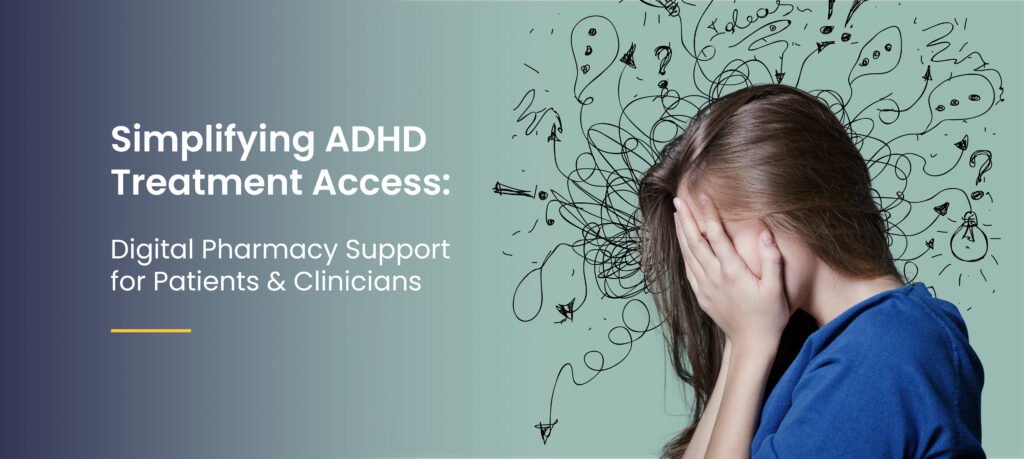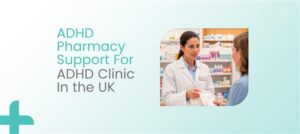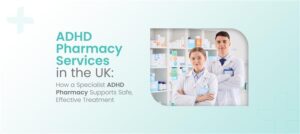Simplifying ADHD Treatment Access: Digital Pharmacy Support for Patients & Clinicians

When Focus Feels Just Out of Reach
It often starts with a small frustration — missed deadlines, forgotten tasks, conversations that drift away mid-sentence. For parents, it can look like constant reminders and endless energy; for adults, it can feel like trying to live life with 20 browser tabs open in the mind.
For people living with ADHD (Attention-Deficit/Hyperactivity Disorder), these everyday moments can quietly shape their confidence, work, and relationships. And while awareness has grown in recent years, accessing consistent, compassionate care hasn’t always kept pace.
Across the UK, thousands of patients face long NHS waiting lists or inconsistent medication availability, even after diagnosis.
That’s where Pharmazon’s role begins, not as a prescriber, but as a trusted, regulated partner helping patients receive their prescribed treatment safely, privately, and without stress.
What ADHD is (and isn’t)
ADHD is a neurodevelopmental condition that affects attention, impulse control, and activity levels in children and adults. Symptoms start in childhood and can persist into adult life. diagnosis is clinical (there’s no single blood test). UK care follows the NICE NG87 guideline for recognition, diagnosis, and management.
Two diagnostic systems are commonly referenced:
- DSM-5-TR (used widely in research/clinics): defines symptom thresholds and age-of-onset; the 2022 text-revision clarified wording but kept the criteria structure.
- ICD-11 (WHO): global diagnostic standard; clinical descriptions published in 2024.
The Hidden Face of ADHD: Beyond Hyperactivity
Many adults, especially women, present primarily with inattentive symptoms: chronic disorganisation, emotional overwhelm, and internal restlessness rather than physical hyperactivity. This nuance helps parents and partners recognise ADHD’s quieter forms.
Comorbidities Often Assessed Alongside ADHD
ADHD rarely exists in isolation. Research shows that 60–80% of individuals with ADHD have at least one comorbid mental health or neurodevelopmental condition.
Commonly overlapping conditions include:
- Anxiety disorders – persistent worry or panic symptoms that heighten distractibility and sleep problems.
- Depression – emotional dysregulation, low motivation, and fatigue that can mask or mimic ADHD features.
- Autism spectrum disorder (ASD) – shared traits such as social communication differences, sensory sensitivity, and rigid routines.
- Specific learning disorders – particularly dyslexia and dyspraxia, which can compound academic challenges.
- Sleep disorders – delayed sleep phase, restless legs, or insomnia that worsen concentration and emotional regulation.
Because of this overlap, comprehensive ADHD assessments routinely include screening for mood, anxiety, learning, and sleep issues. Addressing these together leads to more effective treatment planning and better long-term outcomes.
How ADHD Is Diagnosed in the UK
Diagnosis is clinical, based on specialist assessment, not a quick test or questionnaire.
- GP referral → to CAMHS (children) or adult psychiatry service
- Comprehensive assessment, using DSM-5-TR/ICD-11 criteria
- Validated rating scales:
- ASRS-v1.1 (adult)
- Vanderbilt and SNAP-IV (child/teacher reports)
- Objective tools (optional): QbTest, which measures attention and movement, is now recommended by NICE as an aid for ages 6–17
- Right to Choose pathway: allows NHS-funded assessment with approved private providers to reduce waiting times.
Lifestyle and Behavioural Strategies That Work
ADHD care is most effective when behavioural and environmental strategies complement clinical treatment. These approaches can begin even before medication.
- Parent Training and Behavioural Programs: Structured behavioural parent training (BPT) helps reduce challenging behaviours and strengthens positive interactions.
- Cognitive Behavioural Therapy (CBT) for Adults: CBT tailored to ADHD improves time management, organisation, and emotional control. Studies show significant symptom reduction when CBT is added to usual care.
- Sleep Hygiene: Over 70% of children with ADHD have sleep difficulties. Behavioural sleep interventions not only improve rest but also modestly reduce ADHD symptoms.
Simple steps: consistent bed/wake times, no screens 1 hour before bed, and a calm bedtime routine. - Exercise: Regular physical activity boosts focus and executive function.
Simple steps: Schedule 20–30 minutes of activity before demanding cognitive tasks. - Nutrition: Balanced meals with lean protein, complex carbs, and fibre remain the best baseline strategy.
Quick Starters for Parents and Adults
For Parents
- Use visual routines (morning, homework, bedtime)
- Praise effort (“I like how you started right away”)
- Encourage short movement breaks before focused tasks
- Ask your clinician about parent-training programmes
For Adults
- Anchor two habits: consistent wake time and daily 15-minute planning
- Use 25-minute “focus sprints” with one visible task list
- Batch notifications and schedule screen breaks
- Exercise before heavy mental tasks to sharpen focus
Understanding ADHD Care in the UK
ADHD is a neurodevelopmental condition that affects both children and adults. It isn’t just about attention; it influences mood, motivation, and daily structure.
Treatment typically combines multiple layers of care: medical management, behavioural strategies, counselling, and lifestyle support.
But the path from diagnosis to consistent management can be complex:
- Long waiting lists for NHS assessments and medication initiation
- Regional shortages or stock issues at local pharmacies
- The emotional toll of navigating care, paperwork, and refills
Pharmazon helps simplify one part of that journey — ensuring that when a licensed clinician prescribes treatment, filling, verifying, and delivering that prescription is smooth, confidential, and fully compliant with UK pharmacy standards.
Medical management of ADHD
Medication | Type | How It Works | Dosing |
Methylphenidate | Stimulant | Boosts dopamine and norepinephrine to improve focus and control impulses | Daily (short- or long-acting) |
Lisdexamfetamine | Stimulant | Converts to dexamfetamine in the body for a smoother effect | Once daily |
Dexamfetamine | Stimulant | Directly increases dopamine and norepinephrine activity | 1–2 times daily |
Atomoxetine | Non-stimulant | Selective norepinephrine reuptake inhibitor | Once daily |
Guanfacine | Non-stimulant | Regulates attention and impulse control via alpha-2 receptors | Once daily |
How Pharmazon Supports ADHD Patients and Clinics
Pharmazon is a UK-registered online pharmacy and home care provider offering a secure, convenient prescription delivery service.
For ADHD patients, that means easier continuity of care — especially for those prescribed privately through specialist clinics.
Our service includes:
- Clinical Verification – every prescription is reviewed by a UK-registered pharmacist.
- Secure Dispatch – prescriptions are handled under strict regulatory standards.
- Discreet Packaging – for privacy and comfort at delivery.
- Reliable Delivery Options – same-day service in London, next-day nationwide.
- End-to-End Support – seamless coordination between prescriber, patient, and pharmacy.
We work alongside clinicians, never replacing them — helping patients stay consistent and confident in their care.
Why Consistency Matters in ADHD Treatment
ADHD management depends on rhythm — regular appointments, steady routines, and uninterrupted treatment.
When medication supply falters or refills are delayed, it can disrupt progress and add unnecessary anxiety. Pharmazon’s role is to protect that rhythm: by making sure prescriptions, once written, translate into timely, stress-free access.
Our team understands that ADHD care isn’t just clinical — it’s deeply personal. Each secure delivery represents a smoother day, a calmer morning routine, and a patient who can focus on life instead of logistics.
A New Kind of Pharmacy Experience
Traditional pharmacies can sometimes feel overwhelming — long queues, busy counters, and a lack of privacy.
Pharmazon reimagines that experience through technology, trust, and empathy:
- Digital efficiency meets human care.
- Regulated process meets personal discretion.
- Modern home delivery meets traditional pharmacy integrity.
For clinicians, it means reduced admin. For patients, it means confidence that every order is verified, compliant, and delivered with care.
Pharmazon’s Promise
At Pharmazon, our goal is simple: to make healthcare more humane.
We combine digital convenience with professional oversight — so patients, families, and clinicians can focus on outcomes, not obstacles.
Because for those living with ADHD, support shouldn’t stop at the prescription pad. It should continue all the way to their doorstep — safely, privately, and on time.




